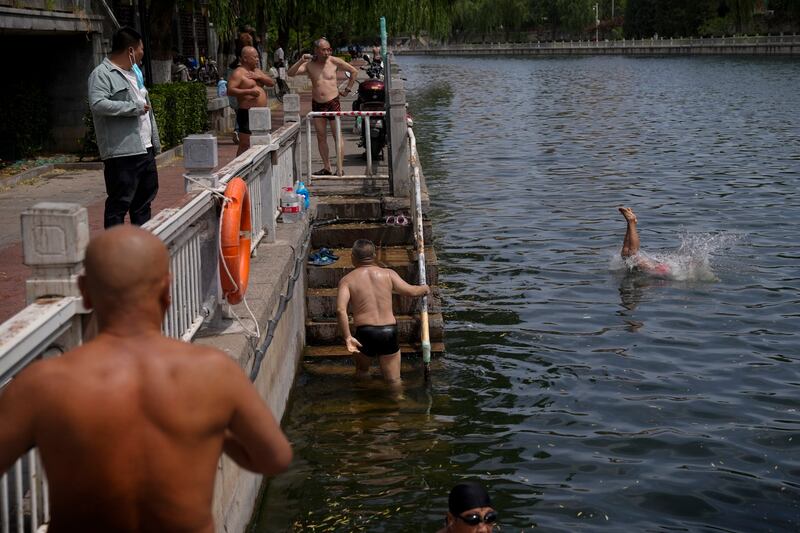An early heatwave in southern and southwestern China, which saw electricity demand hitting peak levels in May, suggests that China may face another scorcher of a summer – even fiercer than last year’s record-breaking season, according to meteorological reports.
So far, the heat has reportedly been particularly punishing on animals, with hundreds of pigs perishing in Jiangsu, central China, fish dying in southwestern China's Guangxi province and Chengdu suffering shortages of rabbit heads – a much-loved Sichuanese street snack.
Peak electricity demand was recorded in late May, a month earlier than last year, while in Beijing the temperature is expected to nudge at 40 Celsius (104 Fahrenheit) next week and Shanghai recorded a 150-year-record-high temperature for the month on May 29 at 36.7 C (98 F), eclipsing the previous high of 35.7 C (96.3 F) recorded in May 1876.
Was last year a warm-up?
Last summer, RFA reported that industry in the Yangtze Region, including semiconductor manufacturer Foxconn, was forced to scale back on production amid a heatwave and drought, in which the authorities prioritized residential electricity supply so that people could run air-conditioning.
“The Yangtze River delta has never experienced such high temperatures since historical records began, and high temperatures like this are accompanied by drought,” Jiangsu-based current affairs commentator Zhang Jianping told Radio Free Asia at the time.
The unseasonably hot weather in China comes on the heels of record-breaking temperatures in Southeast Asia during April and May, as RFA reported.
In Thailand, Myanmar, Vietnam and Laos, the heat led to deaths and hospitalizations, closed schools and caused losses to farmers and business-owners.
The region saw the mercury reach record highs everywhere, with Thailand’s capital, Bangkok, experiencing its hottest day on record on April 6, 2023, when the city recorded a temperature of 40.2 C (104.4 F).
The heat index, which measures how hot it feels when humidity is factored in, reached a staggering 50.2 C (122 F) in some areas of Bangkok, according to local news reports.
The ‘worst heatwave in history’
Some experts are already calling it the "worst heatwave in history" and it is not just affecting Southeast Asia and China; records are even being broken in high-latitude Siberia, CNN reported.
Jalturovosk in Siberia had its hottest day in history on June 3 at 37.9 C (100.2 F), according to Maximiliano Herrera, who tracks extreme temperatures across the globe.
Experts blame it on global warming, El Niño, atmospheric blocking patterns and urban heat island effects.
But a likely return of El Niño, a weather pattern caused by warming of sea-surface temperatures in the Pacific Ocean, is of particular concern this year, according to the World Meteorological Organization.

In an update on May 3, the WMO warned that there is a 60% chance for a transition to El Niño during May-July 2023, increasing to about 70% in June-August and 80% between July and September.
The organization added that the development of an El Niño will most likely lead to a new spike in global heating and increase the chance of breaking temperature records. It advised the world to prepare for the impacts, such as increased rainfall, droughts, heat waves and storms.
China and beyond
Back in China, local reports are already warning of possible hardships to come, chiefly focusing on the possibility of a food security crisis involving essential crops such as wheat, which has already been affected by heavy May rain and high temperatures, and rice, which Chinese agricultural experts are warning will likely be affected by high temperatures and drought conditions.
On June 2, China’s Meteorological Agency held a press conference, in which experts urged local governments to prepare for the coming heat, warning that densely urban areas are likely to be vulnerable to the so-called “urban heat island effect” and rural areas suffering from heatwaves will also likely experience droughts, the combination of which can devastating to crops.
Bloomberg reports that China has so far avoided any large-scale power cuts, but shoppers are spurning daytime shopping for night markets and beer and ice cream sales have risen.
Air conditioner sales are up 95% from last year, according to local Chinese-language news reports.
A UN report in March warned that "every increment" of global warming will escalate multiple and concurrent hazards.
According to scientists, the past eight years have been the eight warmest on record globally, with 2016 being the hottest on record.
The World Meteorological Organization says that is primarily due to the “double whammy” of a powerful El Niño event and human-induced warming from greenhouse gasses.
Edited by Mike Firn and Malcolm Foster.
